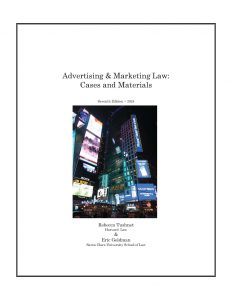Announcing the Seventh Edition of Advertising & Marketing Law Casebook by Tushnet & Goldman

* DRM-free PDF file. Price: $12
* Kindle. Price: $9.99
* Print-on-demand paperback from Amazon. Price: $30 + shipping and tax. Paperback buyers can get a free PDF file by emailing me a copy of their receipt showing which edition they bought.
If you are a professor, or are hoping to teach the course, and would like a free evaluation copy, please email me (egoldman@gmail.com).
A sample chapter, Chapter 14 (on publicity rights and endorsements), is available as a free download. We also have two online-only chapters on housing discrimination (Chapter 20) and political advertising (Chapter 21), both also freely downloadable.
We’ve discussed the book’s background and our goals as authors in this essay.
What Does the Book Cover?
Preface
Chapter 1: Overview
Chapter 2: What is an Advertisement?
Chapter 3: False Advertising Overview
Chapter 4: Deception
Chapter 5: Which Facts Matter? Reasonable Consumers and Materiality
Chapter 6: Omissions and Disclosures
Chapter 7: Special Topics in Competitor Lawsuits
Chapter 8: Consumer Class Actions
Chapter 9: False Advertising Practice and Remedies
Chapter 10: Other Business Torts
Chapter 11: Copyrights
Chapter 12: Brand Protection and Usage
Chapter 13: Competitive Restrictions
Chapter 14: Featuring People in Ads
Chapter 15: Privacy
Chapter 16: Promotions
Chapter 17: The Advertising Industry Ecosystem–Intermediaries and Their Regulation
Chapter 18: Case Study: Food, Drugs, and Supplements
Chapter 19: Case Study: Organic and “Green” Claims
Chapter 20 (online only): Case Study: Regulation of Discriminatory Advertising (Mostly Housing)
Chapter 21 (online only): Case Study: Regulation of Political Advertising
What Changed from the Sixth to the Seventh Editions?
We didn’t make many major changes in this edition. Most minor changes are standard updates. Some hot areas include courts’ treatment of reasonable consumers, online discrimination in ad targeting, and Section 230’s application to scammy online ads.
If You Are Teaching (Or Want to Teach) Advertising Law
For reasons why you should consider teaching an advertising law course, see this post. In addition to a complimentary book copy, we can provide (1) access to the Georgetown Intellectual Property Teaching Resources database, with digitized props galore; and (2) our PowerPoint slide decks, lecture notes, and other materials. If you are creating a new course, we can provide feedback on your draft syllabus and course proposal. Email me! You can see my old syllabi and exams on my Advertising Law course page.
Pingback: Everything You Wanted to Know About the Moody v. NetChoice Supreme Court Opinion - Technology & Marketing Law Blog()